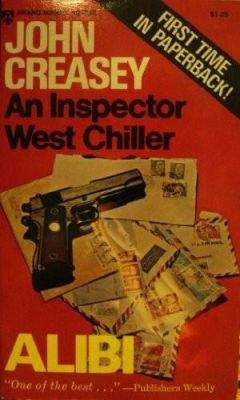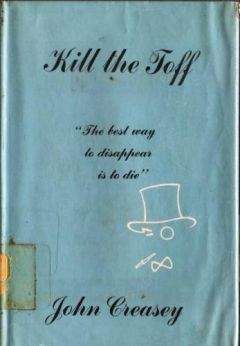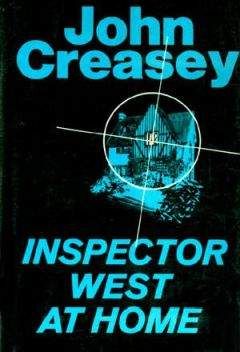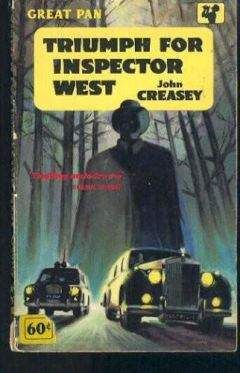John Creasey - Inspector West Alone
На сайте mybooks.club вы можете бесплатно читать книги онлайн без регистрации, включая John Creasey - Inspector West Alone. Жанр: Прочее издательство неизвестно,. Доступна полная версия книги с кратким содержанием для предварительного ознакомления, аннотацией (предисловием), рецензиями от других читателей и их экспертным мнением.
Кроме того, на сайте mybooks.club вы найдете множество новинок, которые стоит прочитать.
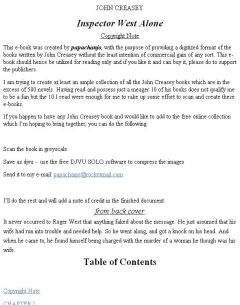
John Creasey - Inspector West Alone краткое содержание
Inspector West Alone читать онлайн бесплатно
She rang the bell, and the interview was over.
* * * *
Roger knew where he had seen her face before—in the newspapers.
It had been a bad likeness, but he had placed her when she had talked of currency smuggling—one of the biggest rackets with which the Yard was dealing, one with widespread ramifications and an incredible number of loopholes. She was Mrs. James Delaney—the Honourable Mrs. James Delaney. Her husband was the son of an impoverished peer, and as far as the Press reports had implied, the charges against him were trivial. So this was a job where the Yard had played canny with the Press, giving no indication of the scope of the offences.
His room was large, and had every comfort; it overlooked the garden at the back. Off with the old luxury, on with the new. Tea arrived; and half an hour afterwards, two bulky brief-cases were brought in. Then he was left on his own. . . .
He felt a strange nostalgia.
Here was his work; the careful study of amassed facts, the scrutiny of detail, the building up of a case. This one had started when a Customs officer had discovered that Delaney was taking a hundred pounds above the allowed maximum, in sterling, out of the country—nothing remarkable. But some correspondence had been found in his cases—the fools always had something like that, they seldom destroyed all the evidence—showing a list of French and Swiss people with whom Delaney was in contact. Currency smugglers, all small, had been in touch with the same people. There was an astonishingly detailed account of what the Yard man had asked Delaney and what information he had given away.
It was nearly eight o’clock when he had finished, rubbed his eyes after the concentrated reading, and rang the bell. The footman answered him promptly.
“I would like to see Madame,” Roger said.
“Madame would like you to dine with her, sir, and dinner will be at eight-thirty. It is not usual to change.”
* * * *
She had changed into a black dress which had touches of white at the cuffs and neck. She waited for him in a small room, off the dining-room; there was an elaborate steel and coloured-glass cocktail bar. She was grave when she offered him a drink; grave while they drank; she looked pale but not worried, and she knew what the answer was going to be. But she didn’t ask a question until dinner was nearly over and they were at the sweet; it had been a meal to dream about.
She looked at him suddenly.
“Have you reached an opinion?”
“Yes.”
“What is it?”
“You’re quite right. He has little chance of getting off.”
“Have you found any loop-hole?”
“There isn’t one. He wasn’t clever when dealing with the police.”
“No,” she said, and smiled, as a mother might smile over an erring child. “He isn’t used to dealing with the police. He is under remand———”
“There was a note about that. He’s at Brixton, and the case comes up at the Old Bailey on Monday or Tuesday next week. I’m sorry, but it’s a simple fact that he hasn’t a chance. You probably think it’s harsh, because before the war this wouldn’t have been an offence, but——” he shrugged. “At least he hasn’t involved you in any way.”
“I am not involved. I didn’t know what he was doing. I had no idea that I owed so much to that particular kind of activity.” She smiled; she was really quite beautiful. “I am vain enough to think he probably sank deeper and deeper into it, because of me; that is why it is essential that I should help him. He mustn’t go to prison.”
“You can’t prevent it.”
“He wouldn’t go to prison if he were never tried, would he?”
Roger saw the truth then, in a blinding flash.
“And he won’t be tried if he’s removed from Brixton before the trial or on the way, will he? You know the daily routine at Brixton thoroughly—I want you to decide what is the best way to get him out. Then I want you to organize it. I have everything ready to leave the country; once I am safely away with him there will be nothing to worry about. Mr. Kennedy is extremely able, and he is arranging all that for me. Don’t say that it can’t be done, Mr. Rayner. It must be done.”
CHAPTER XV
JAIL BREAK
PERCY drove Roger from the Delaney house to London, and they picked Kennedy up at Putney Bridge. It was high time Roger knew where to find Kennedy; high time he went over to the attack, but—patience was vital, Kennedy was still dangerously wary.
Kennedy sank down in his corner and spoke almost as soon as the door closed.
“She says you’re very sure of yourself.”
“I am.” Roger had told the woman that it could be done; and knew that it could.
“When are you going to do it ?”
“Sunday night. There’s always less discipline on Sunday night at any jail.”
“I’ll believe you. How are you going to do the job?”
“I want two powerful men, one waiter’s rig-out, one police-constable’s uniform, and a girl, to give me an alibi. The uniform must be a good one, with genuine fixings— numbers and badges. Dinner will be taken into his room that night by my waiter. My constable will follow and deal with the duty warder. I shall want to drill that constable and waiter myself, and they need to be good. You’ll have to make arrangements with the restaurant from which Delaney gets his special food to allow my waiter to work for them that night.”
“What risks are you going to take yourself?”
Roger laughed. “I’ll drive the car we get away in, if you call that a risk.”
“I can’t see the scheme yet,” Kennedy said.
“I’ll work that out with the two men and the girl— you’re not interested in the scheme, only in the results.”
Kennedy laughed; his eyes were half-closed, just silvery slits.
“In some ways you’re better than I expected, Rayner! What else do you want from me?”
“Two cars. An ordinary, shabby one outside the prison, and a fast one stationed half a mile away. How are you going to get the couple out of the country?”
“By air.”
“Where from?”
“I’ve a private airfield near Watford.”
“I don’t want to know where it is, yet,” said Roger, “but when I’m in that fast car, I want someone with me who knows the road and can guide me there without losing a minute. Then I want a different car ready at the airfield to take me away. All right?”
“I’ll see you,” said Kennedy. “I want you to keep going, don’t make any mistake about that.”
* * * *
It was dark outside Brixton Jail. Only a few lights glowed at the street lamps; beyond the high grey walls, dim yellow squares shone against blackness. Two policemen stood on duty outside the iron gates. A little Morris car, grey, dirty, and with adjustable registration plates which could be changed by pressing a button in the dashboard, was round the corner from the gates. Roger sat at the wheel, with a girl by his side—a pretty little blonde showing no intelligence and no nerves; if she had any, she didn’t betray them that night, She would swear, if need be, that he had been with her all the evening, at her rooms.
He knew what was happening inside, could follow every move of the policeman and the waiter.
* * * *
The waiter had arrived first.
There was a trail of them, most nights, to the prisoners under remand, who had privileged treatment if they had plenty of money. The waiter came from a nearby restaurant. He carried his tray, with a huge metal cover over it. The gate guards let him through. He walked to the main doors of the remand building, and there a warder lifted the lid off the tray.
“Don’t let it get cold,” said the waiter.
“Smells all right.” The policeman lifted the lids off the three dishes. The light was good enough to let him make sure that nothing was being taken in which the prisoner might use—to help himself escape or to do violence; suicide was the most likely form of escape. “You’re new, aren’t you?”
“Days mostly. I’m doing a special turn to-night.”
The warder laughed.
“Okay.”
The waiter went inside. The building was badly lighted, bare, but not like a prison; the remand “cells” were plainly furnished rooms with low ceilings. Another warder, a tall, gangling man with drooping eyelids approached the waiter.
“Who for?”
“Mr. Delaney.”
“Okay.” The warder led the way, jangling his keys. A prisoner had a midget radio on, playing softly; it wasn’t allowed, but there were ways and means, according to the station in life of the prisoner; you just didn’t hear that music if you were on the staff. The warder unlocked the door of Delaney’s room, and as he did so, a constable appeared at the end of the passage. He walked smartly along, as the waiter went inside followed by the warder.
The warder would watch every movement, make sure that nothing but the food passed from waiter to prisoner.
Delaney sat in an easy-chair. He was fair, blue-eyed, slim, dressed well—almost an exquisite. His expression spoiled his good looks; he was frowning, and looked as if he were suffering physical pain. He didn’t look up as the waiter approached the small table and began to lay the cloth. A cigarette drooped from his lips, and his eyes were closed; he had long curling lashes, as fair as his hair.
The constable turned into the room.
“Now what?” asked the warder.
“Mr. Carnody sent me from the Yard,” said the constable easily. Carnody was a Yard Superintendent who dealt most frequently with Brixton. “Just seen old Do-Do. He said you could tell me what I want. About him.” He nodded casually towards the drooping prisoner.
“Just you wait a minute,” said the warder.
“Okay, okay.” The policeman unbuttoned the breast pocket of his tunic, and looked up and down the passage.
No one else was in sight. He drew out what looked like a white pencil, and the warder watched the waiter.
“Now,” said the policeman.
“Shut up,” said the warder, and turned his head.
The policeman broke the white “pencil” across the other’s chin and drove a terrific punch into his stomach. The warder gasped and doubled up; and tear gas, billowing up in a whitish cloud, stung his mouth, nose and eyes. As he staggered back, the waiter snatched a gas-mask from his pocket and tossed it to Delaney.
“Put that on—quick!”
Delaney gaped.
“Put it on.” The waiter slipped a mask over his own face, the constable did the same with swift, practised movements. The waiter helped Delaney with his. The policeman bent over the warder and struck him on the nape of the neck with a length of rubber; the man stopped spluttering and struggling, but wheezed badly.
The waiter said in a muffled voice: “Get your top clothes off,” and tugged at Delaney’s coat sleeve.
Delaney jumped to it then.
* * * *
Roger felt Delaney’s hands and body shaking.
“Take it easy,” he said.
They were in the fast car, half a mile from Brixton and no alarm had been raised. The waiter and the girl were now in the muddy grey Morris, which was still parked along the road. This car, a Buick, leapt along.
“You’ll be all right. Your wife has fixed this. There’s an aeroplane waiting to take you out of the country. Everything’s fixed—just sit back.”
There was little traffic on a Sunday night, and no need to go through the West End. Roger kept strictly down to the speed limit of thirty miles an hour while he was in the built-up area. Policemen, people, cars, and buses passed them, cinema lights glowed; but soon they were in the suburbs and on the main arterial road. Roger opened out. Delaney, who hadn’t uttered a word, said at last: “Who —who are you?”
“Never mind.”
“Where are we going?”
“Airfield, near Watford.”
“Are you sure——”
“There’s a whisky flask in the dashboard pocket. Have a good nip. You’ll be out of the country in two hours, and your wife will be with you.”
Delaney kept the bottle to his lips long enough to drain the flask. Roger watched the telegraph wires and poles flashing by. He’d altered his original plans in only one way; he’d driven along this road the previous night, so as to become familiar with it, and didn’t need a passenger for a guide. The lights of Watford stretched out in front of them, tiny glims in the darkness. They reached the airfield, where two aeroplanes, both small, were warming up. A flare glowed like a torch of liberty.
Beneath a tiny hangar, Mrs. Delaney waited. The pilot of their aircraft called : “You ready?” Two or three other people watched from the surrounding darkness, Roger felt their gaze. Was Kennedy here ? Or Percy ? He felt the keen wind as he opened the door. Delaney got out the other side, and his wife rushed towards him.
“Save it!” snapped Roger. “Get in.”
She turned towards him, and there was just enough light to show her beauty and the glow in her eyes. She thrust a thick packet into his hands.
He watched them climb in; saw the mechanic take the chocks away from the wheels, and stood by the side of the car as the aircraft taxied along the even grassland and then took off. Roger didn’t wait any longer, but got back into the car and drove as far as the gates. There, a smaller car was parked with the headlights on.
A man stood by it: Percy.
“Not bad,” Percy said. It was the nearest thing to a friendly word that he had uttered.
“Change the number plates of that Buick before you go anywhere,” Roger said. “And don’t go back along the main road. Risk a late night.”
“Think you were followed?”
“I know I wasn’t followed. I also know the fantastic coincidences that can catch crooks.”
“Okay, okay,” said Percy. “Your night out.”
No one was in Lyme Street, no one watched from the shadowy doorways. Roger walked briskly from the Strand, and turned into his doorway. As he unlocked the front door he glanced right and left. Now that he was back and it was over, his heart beat like a trip-hammer. He stepped inside and closed the door, then wiped off the perspiration on his forehead. So often he had waited, at just such a place as this, to catch a crook who believed that he’d been completely successful. He switched on a landing-light, which had another control switch upstairs. The building was silent. He reached his own door—the flat—unlocked it and went inside. It was Harry’s night out, and the flat was in darkness. He went from room to room, switching on the lights. He mixed himself a drink, looked at the dish of sandwiches and the plate of smoked salmon left for him by Harry, and laughed. He lit a cigarette. Then he caught a glimpse of himself in the mirror. He showed signs of strain.
He took the packet which Mrs. Delaney had given him from beneath his coat. It was of brown paper, heavily sealed. He opened it. There were packs of one-pound notes inside, some new, most of them old, all tightly held together by adhesive paper. He counted one pack—a hundred. There were five packs. There was something else, too—a piece of cotton wool, which dropped from the paper and fell at his feet. He picked it up. Something hard was inside it. He unwrapped it, and a single diamond scintillated dazzlingly, the size of a small peanut, worth— he couldn’t guess what it was worth.
Похожие книги на "Inspector West Alone", John Creasey
John Creasey читать все книги автора по порядку
John Creasey - все книги автора в одном месте читать по порядку полные версии на сайте онлайн библиотеки mybooks.club.
